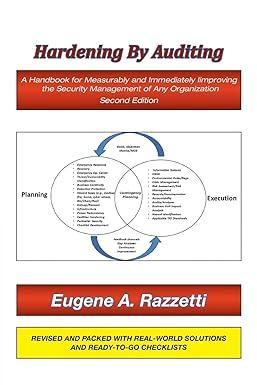Question
1) The operating cycle begins with A) the acquisition of goods. B) the receipt of cash from customers. C) the payment for goods. D) the
1) The operating cycle begins with
A) the acquisition of goods.
B) the receipt of cash from customers.
C) the payment for goods.
D) the initial investment by owners.
E) the sales to customers.
2) Net income is
A) the difference between revenues and dividends
B) the difference between revenues and retained earnings.
C) the difference between cash and dividends.
D) the difference between revenues and total assets.
E) the difference between revenues and expenses.
3) Revenues are
A) increases in liabilities resulting from delivering goods or services to customers.
B) decreases in net assets resulting from delivering goods or services to customers.
C) increases in net assets resulting from delivering goods or services to customers.
D) decreases in retained earnings resulting from delivering goods or services to customers.
E) another term for assets.
4) The operating cycle is the time it takes for a company to buy goods. True or False
5) The additional owners' equity generated by net income or net profits is used to increase retained earnings. True or False
6) For revenue to be earned under the cash basis of accounting, the cash from the customer must be received. True or False
7) According to U.S. GAAP, revenue is recognized when it is
A) realized or realizable only.
B) earned only.
C) received in a timely fashion.
D) earned and realized or realizable.
E) received in cash.
8) Performing a service and receiving a promise to pay from the customer would
A) increase revenue.
B) decrease assets.
C) increase liabilities.
D) decrease expenses.
E) decrease revenue.
9) Revenue is recognized when a customer's promise to pay exists, even if the company is not relatively certain that they will receive payment. True or False
10) The recording of expenses in the same time period as the related revenues are recognized is known as
A) cost recovery.
B) realization.
C) matching.
D) recognition.
E) period costs.
11) Which of the following accounts is increased with a debit?
A) Accounts Payable
B) Notes Payable
C) Merchandise Inventory
D) Capital
E) Sales Revenue
12) The right side of a T-account always increases an account balance and the left side of a T-account always decreases an account balance. True or False
13) Posting is the process of transferring information from the
A) journal to the ledger.
B) ledger to the journal.
C) journal to the balance sheet.
D) income statement to the balance sheet.
E) ledger to the income statement and balance sheet.
14) A compound journal entry
A) is a general ledger transfer that affects more than two accounts.
B) is a general journal transfer that affects more than two accounts.
C) is a journal entry for more than two transactions that affects one or more accounts.
D) is a journal entry for a transaction that affects more than two accounts.
E) is not allowed in accordance with U.S. GAAP, but is allowed in accordance with IFRS.
15) The entry to collect cash on account involves a
A) debit to Cash and a credit to Accounts Payable.
B) debit to Accounts Receivable and a credit to Cash.
C) debit to Cash and a credit to Accounts Receivable.
D) debit to Accounts Receivable and a credit to Accounts Payable.
E) debit to Cash and a credit to Sales Revenue.
Step by Step Solution
There are 3 Steps involved in it
Step: 1

Get Instant Access to Expert-Tailored Solutions
See step-by-step solutions with expert insights and AI powered tools for academic success
Step: 2

Step: 3

Ace Your Homework with AI
Get the answers you need in no time with our AI-driven, step-by-step assistance
Get Started


